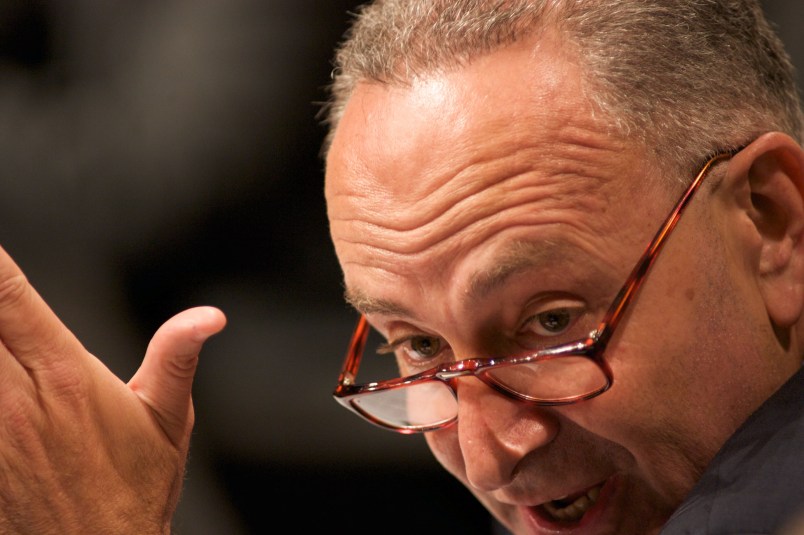Progressives are hoping to keep congressional Wall Street reform negotiators on their best behavior as they iron out the difference between House and Senate legislation. But they fear that at least one Democratic conferee might be a bit meddlesome: Sen. Chuck Schumer (D-NY) is the fourth ranking member on the Bankng Committee, who, despite close ties to Wall Street, laid very low during the financial reform floor fight, raising his head only occasionally to support fellow Democrats as they worked to advance and improve the bill.
Now suddenly he’s one of only a small number of legislators who will get to influence the final product.
“It did surprise me,” said Robert Borosage, co-director of the Campaign for America’s future. “I didn’t expect him to be on it, I have to admit. I assume he must have really asserted himself to get that position.”
“My eyebrows arched when I saw his name,” a Democratic aide told me, echoing that Schumer pushed hard to get aboard.
Now there’s one significant caveat to all this: Schumer is fairly senior on the main committee with jurisdiction over reform. And the three people senior to him: Sens. Jack Reed (D-RI), Tim Johnson (D-SD), and chairman Chris Dodd (D-CT) are all conferees as well. And Johnson was, if anything, less involved than Schumer in crafting and advancing the bill.
But Schumer’s ties to the financial world are famous. And it has some progressives wondering why he wants to be so deeply involved in the end game, if not to tinker with the legislation in non-obvious, but important ways.
“It does seem to put somebody who’s got a lot of conflicting interest–as a senator who represents Wall Street, and the former election committee chair–on the committee,” Borosage told me.
A transparent conference would, of course, make it hard for Schumer–and everybody on the conference–to succumb to Wall Street’s pressures, including on big issues like consumer protections, derivatives regulations, and the Volcker rule, all of which the finance industry would like to see weakened. Whether that’s what we end up with, though, is still an open question.
Late update: Schumer’s office sends over a note from the campaign Americans for Financial Reform thanking him for being a team player on reining in Wall Street. AFR is the biggest regulatory reform umbrella organization in the country, and it includes Borosage’s CAF, as one of its more progressive and high-pressure member groups. That CAF–and a number of other progressive sources–scratched their heads when they saw Schumer’s name on the list of conferees obviously doesn’t imply broad distrust from liberal groups and Democrats. More, it’s an outgrowth of the fact that there are a large subset of progressives who want these Wall Street reforms to be more fundamental, and they don’t think Schumer’s the guy to do that.
But this underscores exactly why outside groups are pushing to open up the process to as much scrutiny as possible. The more transparent it is, the harder it will be for Schumer or anybody else to undercut any of the reforms, and the more incentive they’ll have to actually enhance them.
You can read the whole letter, dated Monday, below.
Dear Senator Schumer,
Thank you for all you have done to hold the big banks accountable. Congratulations on making such significant progress, even as there is more to be done.
You have been an extraordinary champion–thoughtful and dedicated. It was terrific to partner with you and your staff to protect people against predatory practices and the recklessness of Wall Street.
It was especially important and remarkable that you provided this leadership from the position of such an understanding of Wall Street. We owe you such gratitude.
We are so much better off because of your leadership and all you have helped us achieve together.
With appreciation,
Heather Booth
Director
Americans for Financial Reform










